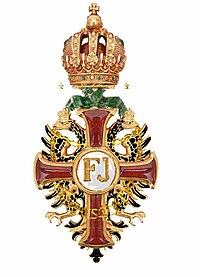Franz Joseph Order
| Imperial Order of Franz Joseph | |
|---|---|
 Badge of the Order
| |
| Awarded by | |
| Type |
Order of merit (1849 - 1918) Dynastic order (1918 - present) |
| Established | 2 December 1849 |
| Royal house | House of Habsburg |
| Motto |
VIRIBUS UNITIS ("With United Forces") |
| Awarded for | Civil and Military Merit |
| Status | Dormant Order since 1918 |
| Sovereign | Crown Prince Karl of Austria |
| Grades |
Knight Grand Cordon with Collar Knight/Dame Grand Cordon Knight/Dame Grand Officer Knight/Dame Commander Knight/Dame Officer Knight/Dame |
| Statistics | |
| First induction | 1849 |
| Last induction | 1918 |
| Precedence | |
| Next (higher) |
Order of the Iron Crown Order of Elizabeth |
| Next (lower) |
Order of Saint George Order of Elizabeth and Theresa |
|
Ribbon of the Order | |
The Imperial Austrian Order of Franz Joseph (German: Kaiserlich-Österreichischer Franz-Joseph-Orden) was founded by Emperor Franz Joseph I of Austria on December 2, 1849, on the first anniversary of his accession to the imperial throne.
The order was originally awarded in three classes: Grand Cross, Commander's Cross, and Knight's Cross. In 1869, the class of Commander with Star was added, which ranked immediately below the Grand Cross. The Officer's Cross, which ranked between Commander and Knight, was introduced on February 1, 1901.
The order ceased to exist with the dissolution of the Austro-Hungarian Empire in 1918. It was not re-established with the foundation of the Republic of Austria.
Knights wore the decoration suspended from a triangular ribbon on the left breast. Officers wore it on the left breast without a ribbon. Commanders wore the decoration at the neck, as did Commander with Star, who in addition also wore a breast star. The Grand Cross was worn suspended from the shoulder and also came with a breast star. The ribbon of all classes of the order was plain red.
In common with the other Austro-Hungarian awards of the period, the Franz Joseph Order was further distinguished with the addition of the War decoration and Swords which could be awarded for military merit. However, if soldiers were honoured, it was usually for distinguished service as opposed to gallantry in the face of the enemy.
...
Wikipedia
